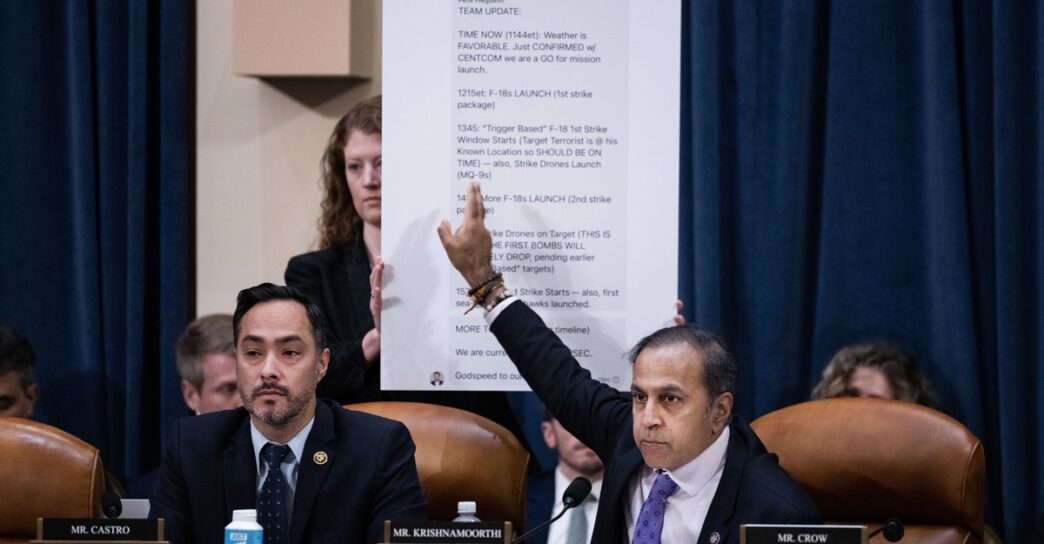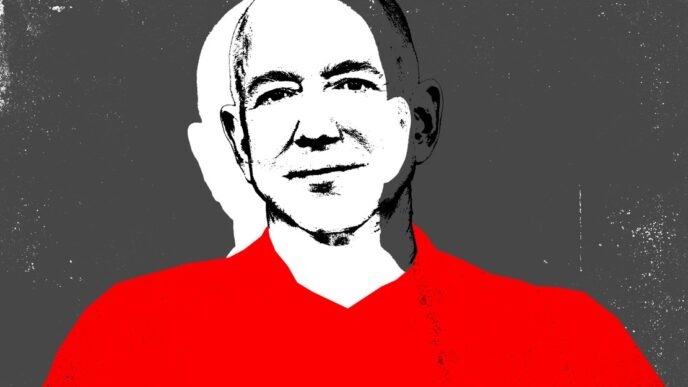This is an edition of The Atlantic Daily, a newsletter that guides you through the biggest stories of the day, helps you discover new ideas, and recommends the best in culture. Sign up for it here.
Chaos is terrifying, which is perhaps why traders were so relieved this morning when Walter Bloomberg tweeted “HASSETT: TRUMP IS CONSIDERING A 90-DAY PAUSE IN TARIFFS FOR ALL COUNTRIES EXCEPT CHINA.” Who exactly Walter Bloomberg is has never been clear, but his feed of financial-news headlines has a large following, and stock indices shot up briefly upon this morsel of hope.
And then—cold, hard reality. Bloomberg’s tweet referred to a Fox News interview with Kevin Hassett, the director of Donald Trump’s National Economic Council, who’d been asked about a pause and replied, “I think the president is going to decide what the president is going to decide.” (Trump never rules out anything, of course.) The White House quickly labeled the report “fake news,” and the markets returned to their previously scheduled slide.
Over the past couple of weeks, the administration has shown again and again that it truly has no idea what it’s doing. The Trump administration has been accidentally texting war plans to my boss, Atlantic editor in chief Jeffrey Goldberg; deporting a person it admits it had no legal reason to deport; and firing people it quickly realizes it needs back. If the start of Trump’s second presidency showed an unfamiliar ability to impose its will, the recent stretch has served as a reminder that Trump is Trump, his administration is not run by polished professionals, he hasn’t learned much since his first term, and there’s no master plan that’s going to save the country.
One of the recurring ideas of the first Trump administration was that he was finally becoming “presidential.” Just like Marx said, this arrived first as tragedy—people really believed it—and then as farce, most prominently in an absurdist X thread by the comedian Megan Amram. By the end of 2020, pretty much no one appeared to buy into the notion.
Then it somehow made a comeback. Observers convinced themselves that they saw a more disciplined Trump—or at least a more disciplined Trump campaign. (My colleague Tim Alberta’s contemporaneous reporting showed the weaknesses of this belief.) They grew frustrated with former President Joe Biden’s age, or his economic policies, or his messaging, and they convinced themselves that Trump couldn’t be that bad. Because hey, chaos is terrifying, and it’s more reassuring to assume some secret plan exists that’s more clever than what meets the eye.
Unfortunately, the only secret plans appear to be the ones that Defense Secretary Pete Hegseth sent to Goldberg. Last week, my colleague Nick Miroff reported that the government had mistakenly arrested Kilmar Abrego Garcia, a Maryland man with protected legal status, and flew him to El Salvador, where he is imprisoned. This is nefarious, but it’s not part of some nefarious scheme; they just messed up. A Justice Department lawyer who admitted as much in court last week has been placed on leave as punishment. The lawyer, Erez Reuveni, is a career Justice Department lawyer, but he’s no liberal plant: He was promoted into his current role by Trump officials just two weeks ago. (The Supreme Court today agreed to an administration request to pause an order requiring it to bring Abrego Garcia home. The Justice Department acknowledged “an administrative error” but insisted that Abrego Garcia is now in Salvadoran custody and beyond U.S. reach—a logic that might be funny if it weren’t so treacherous.)
Nor does the White House have a master plan for the tariffs. Officials were working right up until the last minute to prepare a plan for Trump’s supposed Liberation Day on April 2. Perhaps they should have kept working. The final result includes embarrassing errors like tariffs on uninhabited islands, or an archipelago that houses only U.S. and British military personnel, but it has more fundamental flaws. As Kevin Corinth and Stan Veuger of the conservative American Enterprise Institute explain, the formula the administration used includes a very basic error: confusing retail and import prices. The result is two variables that cancel each other out.
Yet the idea that the president would willingly drive the country toward a likely recession is hard to believe. No wonder that some Very Serious People in finance spent the days leading up to April 2 seriously considering something referred to as the “Mar-a-Lago Accord,” which sought to make sense of Trump’s actions but which my colleague Rogé Karma aptly labeled “QAnon for tariffs.”
Now the tariffs are here, and trillions in market value is gone. Trump’s major response to jitters today was to threaten even higher tariffs on China—showing that he is making it up as he goes and isn’t deterred by the prospect of inflicting more chaos. As long as you don’t look at your own portfolio, you might get some schadenfreude from the X posts of Bill Ackman. The veteran activist investor became a mainstream figure, and a “main character,” in late 2023. Although he was a longtime Democrat, Ackman became furious at campus protests against the Israeli government, and at woke culture more broadly, and embraced Trump. Now Ackman is apoplectic about tariffs, warning of “a self-induced, economic nuclear winter.”
Trump is doing exactly what he said he was going to do. Ackman apparently didn’t believe it. When you’ve become a billionaire, it’s easy to be optimistic: Things have worked out well for you so far! It’s also easy to assume that Trump’s punishment will never come for you. This is the mortar of the Trump coalition: a desire for Trump to take on your adversaries, and a conviction that you’ll never be the one facing his wrath.
Some Trump supporters have already been forced to recognize that they’re vulnerable. The realization has been slower for others, such as the very wealthy. They can overlook incidents like Abrego Garcia’s deportation, although as I have written, they should not: Once the executive branch finds a way to ignore the law for one person, it can ignore the law for any person. Trump’s malice has now visited upon the lawyers whom the rich employ, and now his incompetence is coming for their portfolios. They can’t say they had no warnings.
Related:
Here are four new stories from The Atlantic:
Today’s News
- President Donald Trump threatened 50 percent additional tariffs on Chinese imports if China refuses to remove its retaliatory tariffs on America.
- The Supreme Court temporarily paused a court order to bring back a Salvadoran man from Maryland whom the Trump administration mistakenly deported to El Salvador’s prison.
- Israeli Prime Minister Benjamin Netanyahu met with Trump in Washington, D.C., where they discussed the hostage situation in Gaza and tariffs.
Dispatches
Explore all of our newsletters here.
Evening Read

What the Comfort Class Doesn’t Get
By Xochitl Gonzalez
America is not just suffering from a wealth gap; America has the equivalent of a class apartheid. Our systems—of education, credentialing, hiring, housing, and electing officials—are dominated and managed by members of a “comfort class.” These are people who were born into lives of financial stability. They graduate from college with little to no debt, which enables them to advance in influential but relatively low-wage fields—academia, media, government, or policy work. Many of them rarely interact or engage in a meaningful way with people living in different socioeconomic strata than their own. And their disconnect from the lives of the majority has expanded to such a chasm that their perspective—and authority—may no longer be relevant.
More From The Atlantic
Culture Break

Listen. The first episode of How to Age Up, a new Atlantic podcast, explores whether biohacking actually works.
Watch. Everybody’s Live With John Mulaney (streaming on Netflix) is a late-night experiment that injects some disorder into a languid genre, David Sims writes.
P.S.
I’m excited to be back in the saddle after a few days of vacation, which were reinvigorating despite the premature Final Four demise of my beloved Duke Blue Devils. I spent the last weekend of March at Big Ears, a festival in Knoxville, Tennessee. My colleague Annie Lowrey, a repeat attendee, likes to say it’s the music festival that the NPR station in Parks & Rec would put on. Six years of attendance have convinced me that Knoxville is among America’s most underrated cities. And if you need something soothing in this chaotic moment, let me endorse ganavya, who gave one of my favorite shows of the festival and whose album Daughter of a Temple is musical balm.
— David
Stephanie Bai contributed to this newsletter.
When you buy a book using a link in this newsletter, we receive a commission. Thank you for supporting The Atlantic.














